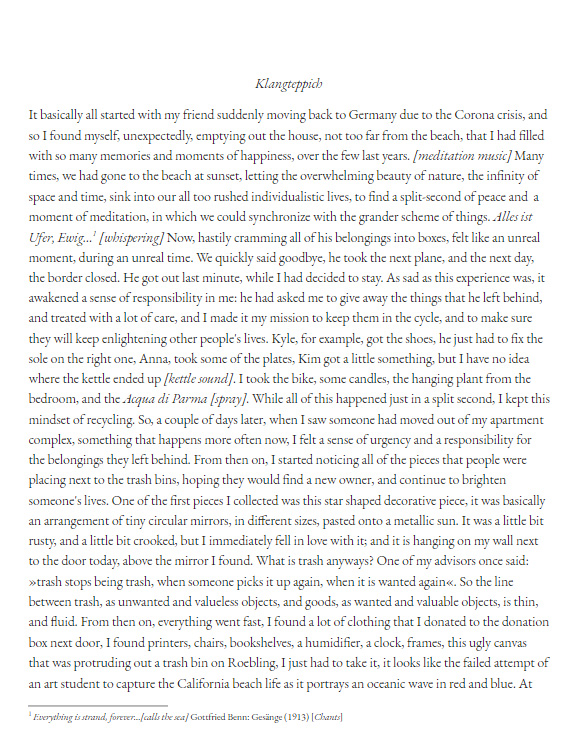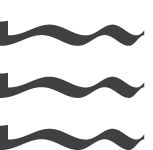Klangteppich
Paul Kurek
What is trash, anyway?
Throughout the crisis, I have witnessed that many of the students who had to move away from Westwood did so in a rush, and threw away their fully intact belongings, clothing, furniture, appliances, etc. Therefore, I have integrated so-called 'dumpster walks' into my daily neighborhood walk routine. I have 'harvested' many things, including printers, fans, furniture, frames, art pieces, etc. Cleaning and sanitizing these things has turned out to be a very rewarding and meditative practice during these days of isolation. Donating, swapping, and selling some of these things has allowed me to buy art from local artists, in so doing, I hope the trash that I ‘untrashed’, continues to spin in healthy re-cycles that help local communities. Decorating my apartment with the pieces I gathered has turned my apartment into a permanently evolving art project. Just the other day, I discovered a 1957 Olympia typewriter that was made in West Germany (where I was born), a very unique and unexpected encounter. Unscrewing and putting it back together felt like ‘repairing history,’ a true spiritual ‘booster.’ Through this ‘debris of history’ that emerged out of the trash in Los Angeles, California, carrying the old, divided Germany that is engrained in its materiality, we learn how borders literally travel over time and space, and are not static objects, but under constant negotiation. In an age where walls seem to be reemerging as ‘functioning’ concept, the story of the revolutionary potential of trash likewise reemerges out of the depth of society.
![]()
What is trash, anyway?
Throughout the crisis, I have witnessed that many of the students who had to move away from Westwood did so in a rush, and threw away their fully intact belongings, clothing, furniture, appliances, etc. Therefore, I have integrated so-called 'dumpster walks' into my daily neighborhood walk routine. I have 'harvested' many things, including printers, fans, furniture, frames, art pieces, etc. Cleaning and sanitizing these things has turned out to be a very rewarding and meditative practice during these days of isolation. Donating, swapping, and selling some of these things has allowed me to buy art from local artists, in so doing, I hope the trash that I ‘untrashed’, continues to spin in healthy re-cycles that help local communities. Decorating my apartment with the pieces I gathered has turned my apartment into a permanently evolving art project. Just the other day, I discovered a 1957 Olympia typewriter that was made in West Germany (where I was born), a very unique and unexpected encounter. Unscrewing and putting it back together felt like ‘repairing history,’ a true spiritual ‘booster.’ Through this ‘debris of history’ that emerged out of the trash in Los Angeles, California, carrying the old, divided Germany that is engrained in its materiality, we learn how borders literally travel over time and space, and are not static objects, but under constant negotiation. In an age where walls seem to be reemerging as ‘functioning’ concept, the story of the revolutionary potential of trash likewise reemerges out of the depth of society.


Paul is a PhD Candidate at the UCLA Department of European Languages and Transcultural Studies. Inspired by his participation in the Mellon-funded UCLA Urban Humanities Initiative Graduate Certificate Program, his dissertation »Heavy Load-Bearing Modernity: A Cultural Geology Albert Speer’s Berlin/Germania« explores the intersectional space of urban, cultural, and soil mechanical histories. Apart from his academic work, he has a passion for performance, and was active in theater, music, and poetry productions in Germany and the US.

